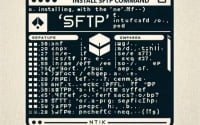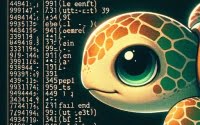Installing and Using the ‘jq’ Command | Linux User’s Guide

Are you struggling with parsing JSON data in Linux? Similar to a Swiss Army knife, the ‘jq’ command in Linux is a versatile tool that can help you manipulate JSON data with ease. The ‘jq’ command is also readily available on most package management systems, making it a straightforward process once you know the steps. Whether you’re using APT package management with Debian and Ubuntu, or YUM with CentOS and AlmaLinux, this guide has got you covered.
In this comprehensive guide, we will walk you through the process of installing and using the ‘jq’ command in Linux. We will delve into advanced topics like compiling from source and installing a specific version of the command. Finally, we will wrap up with guidance on how to use the ‘jq’ command and verify the correct version is installed.
So, let’s dive in and begin installing ‘jq’ on your Linux system!
TL;DR: How Do I Install and Use the ‘jq’ Command in Linux?
In most Linux distributions, you can install ‘jq’ with the package manager. For Debian-based distributions like Ubuntu, use the command
sudo apt-get install jq. For RPM-based distributions like CentOS, use the commandsudo yum install jq.
To use ‘jq’, pipe JSON data into it like this:
echo '{"name": "Anton"}' | jq .name
# Output:
# "Anton"
This command will output the value associated with the ‘name’ key in the JSON object, which in this case is ‘Anton’.
This is a basic way to install and use the ‘jq’ command in Linux, but there’s much more to learn about ‘jq’. Continue reading for more detailed information and advanced usage scenarios.
Table of Contents
- Getting Started with ‘jq’ Command in Linux
- Installing ‘jq’ from Source Code
- Installing Different Versions of ‘jq’
- Basic Usage of ‘jq’
- Exploring Alternative Methods for JSON Parsing in Linux
- Dealing with Common ‘jq’ Command Issues
- Understanding JSON and the Power of ‘jq’
- Exploring the Impact of JSON Parsing in Data Analysis and Web Development
- Wrapping Up: Installing the ‘jq’ Command for JSON Parsing in Linux
Getting Started with ‘jq’ Command in Linux
The ‘jq’ command is a powerful tool for parsing and manipulating JSON data in Linux. JSON (JavaScript Object Notation) is a popular data format used in web development and APIs. ‘jq’ allows you to extract, filter, map, and transform JSON data, making it an essential tool for anyone working with JSON.
Installing ‘jq’ with APT
If you’re using a Debian-based Linux distribution like Ubuntu, you can install ‘jq’ with the Advanced Package Tool (APT). Here’s how:
sudo apt-get update
sudo apt-get install jq
# Output:
# Reading package lists... Done
# Building dependency tree
# Reading state information... Done
# The following NEW packages will be installed:
# jq
# 0 upgraded, 1 newly installed, 0 to remove and 0 not upgraded.
This command updates your package list and then installs the ‘jq’ command. The output confirms that ‘jq’ has been successfully installed.
Installing ‘jq’ with YUM
For RPM-based distributions like CentOS or Fedora, you can use the Yellowdog Updater, Modified (YUM). Here’s the command:
sudo yum install jq
# Output:
# Loaded plugins: fastestmirror
# Loading mirror speeds from cached hostfile
# Resolving Dependencies
# --> Running transaction check
# ---> Package jq.x86_64 0:1.6-2.el7 will be installed
# --> Finished Dependency Resolution
# Installed:
# jq.x86_64 0:1.6-2.el7
This command installs ‘jq’ using YUM. The output shows that ‘jq’ version 1.6 has been successfully installed on the system.
Installing ‘jq’ with DNF
For Fedora 22 and newer versions, or other distributions that use the Dandified YUM (DNF), use this command:
sudo dnf install jq
# Output:
# Last metadata expiration check: 0:01:03 ago on Mon 08 Nov 2021 11:25:31 AM EST.
# Dependencies resolved.
# ================================================================================
# Package Architecture Version Repository Size
# ================================================================================
# Installing:
# jq x86_64 1.6-5.fc34 updates 184 k
# Transaction Summary
# ================================================================================
# Install 1 Package
# Total download size: 184 k
# Installed size: 471 k
# Downloading Packages:
# Total 184 kB/s | 184 kB 00:01
# Running transaction check
# Transaction check succeeded.
# Running transaction test
# Transaction test succeeded.
# Running transaction
# Preparing : 1/1
# Installing : jq-1.6-5.fc34.x86_64 1/1
# Running scriptlet: jq-1.6-5.fc34.x86_64 1/1
# Verifying : jq-1.6-5.fc34.x86_64 1/1
# Installed:
# jq-1.6-5.fc34.x86_64
# Complete!
This command installs ‘jq’ using DNF. The output shows that ‘jq’ version 1.6 has been successfully installed on the system.
Installing ‘jq’ from Source Code
If you want the latest version of ‘jq’ or need a version not available in your package manager, you can compile it from the source code. Here’s how:
git clone https://github.com/stedolan/jq.git
cd jq
autoreconf -i
./configure
make
sudo make install
# Output:
# Cloning into 'jq'...
# remote: Enumerating objects: 18731, done.
# remote: Counting objects: 100% (18731/18731), done.
# remote: Compressing objects: 100% (6140/6140), done.
# remote: Total 18731 (delta 13654), reused 16760 (delta 12412), pack-reused 0
# Receiving objects: 100% (18731/18731), 4.67 MiB | 16.00 KiB/s, done.
# Resolving deltas: 100% (13654/13654), done.
# Updating files: 100% (313/313), done.
This series of commands clones the ‘jq’ repository, configures the build, compiles the source code, and installs ‘jq’ on your system.
Installing Different Versions of ‘jq’
Depending on your needs, you might want to install a specific version of ‘jq’. You can do this both from source and using popular package managers.
From Source
To install a specific version from source, you need to check out the appropriate tag before compiling. For example, to install version 1.5:
git clone https://github.com/stedolan/jq.git
cd jq
git checkout jq-1.5
autoreconf -i
./configure
make
sudo make install
# Output:
# Note: checking out 'jq-1.5'.
# You are in 'detached HEAD' state...
# HEAD is now at f4b2b1a... Update version to 1.5
Using Package Managers
To install a specific version using APT or YUM, you can specify the version number in the install command. For example, to install ‘jq’ version 1.5 with APT:
sudo apt-get install jq=1.5*
# Output:
# Reading package lists... Done
# Building dependency tree
# Reading state information... Done
# The following NEW packages will be installed:
# jq
# 0 upgraded, 1 newly installed, 0 to remove and 0 not upgraded.
With YUM, you can use the following command:
sudo yum install jq-1.5
# Output:
# Loaded plugins: fastestmirror
# Loading mirror speeds from cached hostfile
# Resolving Dependencies
# --> Running transaction check
# ---> Package jq.x86_64 0:1.5-1.el7 will be installed
# --> Finished Dependency Resolution
# Installed:
# jq.x86_64 0:1.5-1.el7
Version Comparison
Different versions of ‘jq’ come with different features and bug fixes. Here’s a brief comparison of versions 1.4, 1.5, and 1.6:
| Version | Key Features | Release Date |
|---|---|---|
| 1.4 | Initial release, basic JSON parsing | 2014-02-12 |
| 1.5 | Added --argjson option, bug fixes | 2015-08-03 |
| 1.6 | Added --rawfile option, performance improvements, bug fixes | 2018-11-01 |
Basic Usage of ‘jq’
Once you’ve installed ‘jq’, you can start using it to parse JSON data. For example, you can use ‘jq’ to pretty-print JSON:
echo '{"name": "Anton", "job": "Copywriter"}' | jq .
# Output:
# {
# "name": "Anton",
# "job": "Copywriter"
# }
This command takes a JSON string, pipes it into ‘jq’, and outputs it in a pretty-printed format.
Verifying ‘jq’ Installation
To verify that ‘jq’ is installed correctly, you can use the jq --version command:
jq --version
# Output:
# jq-1.6
This command outputs the version of ‘jq’ installed on your system.
Exploring Alternative Methods for JSON Parsing in Linux
While ‘jq’ is a powerful tool for parsing JSON in Linux, it’s not the only game in town. Depending on your needs and preferences, you might find other methods more suitable. Let’s explore some alternatives.
Parsing JSON with Python
Python is a versatile language with excellent support for JSON parsing. Here’s an example of how you can parse JSON with Python:
import json
json_string = '{"name": "Anton", "job": "Copywriter"}'
json_data = json.loads(json_string)
print(json_data['name'])
# Output:
# Anton
This Python script imports the json module, loads a JSON string into a Python dictionary, and prints the value associated with the ‘name’ key.
Python’s json module provides a rich set of functions for working with JSON data, including pretty-printing, serialization, and deserialization. However, Python scripts are generally slower than ‘jq’ for large JSON files.
Parsing JSON with JavaScript
JavaScript, being the language of the web, is a natural choice for parsing JSON. Here’s an example of how you can parse JSON with Node.js:
const json_string = '{"name": "Anton", "job": "Copywriter"}';
const json_data = JSON.parse(json_string);
console.log(json_data.name);
# Output:
# Anton
This Node.js script parses a JSON string into a JavaScript object and logs the value associated with the ‘name’ key.
JavaScript’s JSON object provides functions for parsing and stringifying JSON. Node.js scripts are generally faster than Python scripts but slower than ‘jq’ for large JSON files.
Comparing ‘jq’, Python, and JavaScript
| Method | Advantages | Disadvantages |
|---|---|---|
| ‘jq’ | Fast, easy to use in shell scripts | Learning curve, not as flexible as Python or JavaScript |
| Python | Rich JSON support, easy to use in larger programs | Slower than ‘jq’ and JavaScript |
| JavaScript | Natural choice for web development, faster than Python | Slower than ‘jq’, requires Node.js for command-line use |
In conclusion, while ‘jq’ is an excellent tool for parsing JSON in Linux, Python and JavaScript offer viable alternatives, particularly for larger programs or web development. As always, the best tool depends on your specific needs and circumstances.
Dealing with Common ‘jq’ Command Issues
While ‘jq’ is a powerful tool, you might encounter some issues when using it. Let’s explore some common problems and their solutions.
‘jq’ Command Not Found
If you see a ‘jq: command not found’ error, it means ‘jq’ is not installed on your system or not in your PATH. Make sure you have followed the installation steps correctly. To verify ‘jq’ is installed, you can use the which jq command:
which jq
# Output:
# /usr/bin/jq
This command outputs the path to the ‘jq’ executable, confirming it’s installed and in your PATH.
JSON Parse Error
If you see a ‘parse error’ message, it means ‘jq’ encountered invalid JSON. Check your JSON data for syntax errors. You can use an online JSON validator for this purpose.
‘jq’ Command Hangs
If the ‘jq’ command hangs or consumes too much CPU, it could be because you’re processing a large JSON file. In this case, consider using jq in streaming mode with the --stream option. This can significantly improve performance for large files.
echo '{"name": "Anton", "job": "Copywriter"}' | jq --stream .
# Output:
# [["name"],"Anton"]
# [["job"],"Copywriter"]
This command processes a JSON string in streaming mode, outputting each key-value pair separately. Streaming mode can handle larger files than regular mode but produces different output.
‘jq’ Command Outputs Null
If the ‘jq’ command outputs ‘null’, it means the key you’re trying to access doesn’t exist in the JSON data. Check your JSON data and your ‘jq’ command for typos or incorrect keys.
Remember, troubleshooting is a normal part of working with any new tool. Don’t be discouraged by these issues – with a little practice and patience, you’ll be a ‘jq’ expert in no time!
Understanding JSON and the Power of ‘jq’
JSON, or JavaScript Object Notation, is a lightweight data-interchange format that is easy for humans to read and write and easy for machines to parse and generate. JSON is a text format that is completely language-independent but uses conventions familiar to programmers of the C family of languages, including C, C++, C#, Java, JavaScript, Perl, Python, and many others.
echo '{"name": "Anton", "job": "Copywriter"}'
# Output:
# {"name": "Anton", "job": "Copywriter"}
In the above example, we have a JSON object that describes a person’s name and job. It’s a simple, human-readable format that can represent complex data structures.
Why JSON is Important in Modern Computing
JSON is a common data format with diverse uses in data interchange, including that of web applications with servers. JSON is often used when data is sent from a server to a web page. It’s primarily used to transmit data between a server and web application, serving as an alternative to XML.
The Role of ‘jq’ in Handling JSON Data
‘jq’ is like ‘sed’ for JSON data – you can use it to slice, filter, map, and transform structured data. ‘jq’ is specifically designed to handle JSON data, which makes it an excellent tool for log analysis, data visualization, debugging, and even to perform standalone transformations of data.
echo '{"name": "Anton", "job": "Copywriter"}' | jq .name
# Output:
# "Anton"
In the above example, we pipe a JSON string into ‘jq’, which extracts the value associated with the ‘name’ key. This demonstrates how ‘jq’ can easily extract data from JSON.
The power of ‘jq’ comes from its ability to transform the JSON data in complex ways, just using the command line. It’s a lightweight and flexible command-line JSON processor.
Exploring the Impact of JSON Parsing in Data Analysis and Web Development
The relevance of JSON parsing extends far beyond Linux command-line operations. It’s a critical part of data analysis and web development, making ‘jq’ an essential tool for professionals in these fields.
JSON Parsing in Data Analysis
Data analysis often involves dealing with large amounts of structured data. JSON is a common format for such data, especially when it comes from web APIs. ‘jq’ can help data analysts filter and transform this data, extracting the valuable insights they need.
curl 'https://api.github.com/repos/stedolan/jq/commits?per_page=5' | jq '.[].commit.message'
# Output:
# "Merge pull request #2054 from stedolan/backport-2051"
# "Backport #2051 to 1.6"
# "Merge pull request #2051 from wtlangford/fix-2047"
# "Fix #2047"
# "Merge pull request #2048 from stedolan/revert-2046-feature/update-bison"
In this example, we use ‘curl’ to fetch the latest commits from the ‘jq’ GitHub repository, and ‘jq’ to extract the commit messages. This demonstrates how ‘jq’ can be used for data analysis in a real-world scenario.
JSON Parsing in Web Development
In web development, JSON is the de facto standard for exchanging data between the client and the server. ‘jq’ can help web developers debug and test their applications, ensuring the JSON data is correct.
curl 'https://jsonplaceholder.typicode.com/posts/1' | jq .title
# Output:
# "sunt aut facere repellat provident occaecati excepturi optio reprehenderit"
In this example, we use ‘curl’ to fetch a post from the JSONPlaceholder API, and ‘jq’ to extract the post’s title. This demonstrates how ‘jq’ can be used for web development in a practical way.
Further Resources for Mastering ‘jq’ and JSON Parsing
For those interested in diving deeper into ‘jq’ and JSON parsing, below are some valuable resources:
- Official ‘jq’ Manual: The official ‘jq’ manual is the most comprehensive resource for mastering ‘jq’. It covers all the features of ‘jq’, complete with examples.
Learning JSON Path: This article by Stefan Goessner is a great introduction to JSON Path, a language for parsing JSON that’s used by ‘jq’.
Mastering ‘jq’ Course on Udemy: This Udemy course covers ‘jq’ in depth, from basic to advanced usage. It’s a paid course but often available at a discount.
Wrapping Up: Installing the ‘jq’ Command for JSON Parsing in Linux
In this comprehensive guide, we’ve explored how to install and use the ‘jq’ command in Linux, a versatile tool for parsing and manipulating JSON data. We’ve also delved into the background of JSON and why it’s a critical format in modern computing.
We began with the basics, learning how to install ‘jq’ in different Linux distributions using package managers like APT and YUM. We then ventured into more advanced territory, exploring how to install ‘jq’ from source and how to install specific versions of ‘jq’. Along the way, we tackled common challenges you might face when using ‘jq’, such as command not found errors, parse errors, and high CPU usage, providing you with solutions for each issue.
We also explored alternative methods for parsing JSON in Linux, comparing ‘jq’ with Python and JavaScript. Here’s a quick comparison of these methods:
| Method | Advantages | Disadvantages |
|---|---|---|
| ‘jq’ | Fast, easy to use in shell scripts | Learning curve, not as flexible as Python or JavaScript |
| Python | Rich JSON support, easy to use in larger programs | Slower than ‘jq’ and JavaScript |
| JavaScript | Natural choice for web development, faster than Python | Slower than ‘jq’, requires Node.js for command-line use |
Whether you’re just starting out with ‘jq’ or you’re looking to level up your JSON parsing skills, we hope this guide has given you a deeper understanding of ‘jq’ and its capabilities.
With its balance of speed, ease of use, and powerful JSON manipulation capabilities, ‘jq’ is a crucial tool for any Linux user dealing with JSON data. Happy parsing!


